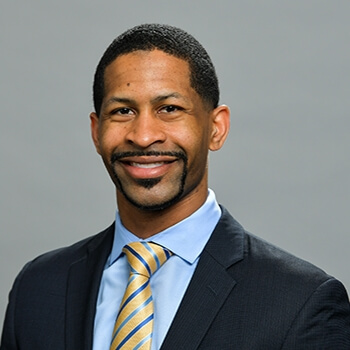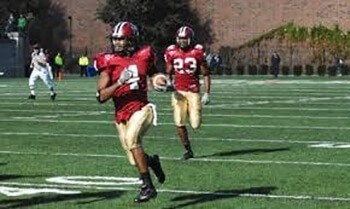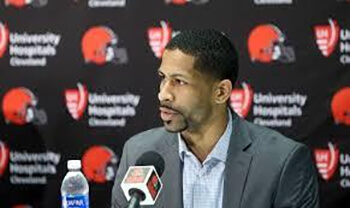Even though Andrew Berry grew up in a football-loving household in suburban Maryland, his mother did everything in her power to keep her sons from playing the sport.
“My brother and I, we were both small and slight for our ages, so our mother never really wanted us to play football,” he said. “She got us involved in every activity under the sun at a really early age—her hope was to change our interest.”
But her crusade was doomed from the start, and the twins started playing tackle football in middle school. Andrew excelled on the gridiron and was starting quarterback for his high school team; his twin brother was the team’s top receiver.
Berry never really considered attending Harvard—he had his sights set on playing football at Stanford. But after Stanford’s football coach was fired and Berry’s scheduled visit to the university was cancelled, he jumped at the opportunity to play for the Crimson. He switched to the cornerback position and started for the team as a freshman.
He found his niche on the Crimson defense—Berry was a three-time All-Conference performer—but he didn’t find that same passion playing out in his academic career as an economics concentrator. All that changed when Berry took Introduction to Computer Science (CS50). He became so fascinated by the field’s versatility that he decided to pursue a computer science master’s degree at the John A. Paulson School of Engineering and Applied Sciences, with a focus on artificial intelligence and machine learning.
“In my computer science courses, I really liked how I would learn programming and algorithmic thinking and then produce something that even my peers thought was cool. It isn’t just a paper—I was building robots to play games or developing a neural network to recognize digits for a post office,” he said. “There’s a certain logic and organization that comes from solving problems in this realm that can be more broadly applied to problems you tackle in the real world, even ones that are not computer science related.”
After graduation, while Berry participated in the Washington Redskins rookie minicamp on a tryout basis, he was resigned to leaving football behind and pursuing a career trading equity derivatives at Goldman Sachs.
But then a window of opportunity opened.
Berry received a call from the director of scouting for the Indianapolis Colts, who offered him an entry-level scouting position in the team’s player personnel department. Initially skeptical, Berry went for the interview anyway and decided the position was too good of an opportunity to pass up.
“That scouting assistant position was a lot like getting a Ph.D. in football,” he recalled. “It was a very inglorious position, doing a ton of gopher work, but I was given the opportunity to work in pretty much every area of football operations.”
Berry’s tasks ranged from scouting players at small colleges to being the shuttle driver on airport runs; one day he’d be holding the chains at practice, and the next he would be helping with an advanced scouting report for an upcoming opponent.
He paid his dues and climbed the ladder within the Colts front office before moving on to serve as vice president of player personnel for the Cleveland Browns. There, he oversaw pro and college scouting and led some of the research and strategy elements related to player personnel.
As he delved deeper into strategy, his computer science training became invaluable.
“When you are thinking of acquiring talent and managing talent on a roster, a lot of it is like pricing risk,” he said. “Machine learning techniques and data are having more of an impact in all the different spaces of football operations. My background has really aided me in terms of being able to speak multiple languages with the decision makers and the analysts, and it has enabled me to be of help with the general strategy in terms of building a team.”
The friction that is created by those new techniques presents a challenge that can sometimes be difficult to overcome. Many personnel decisions in football are still based purely on gut and intuition. There’s a place for that, but using data to help inform those decisions is gaining traction, Berry said. Blending a number of different perspectives and tools to make the best decisions is a complicated task.
Berry has now brought his perspective to the Philadelphia Eagles, where he was named vice president of football operations in February. In his new broader role, he works to develop a winning strategy alongside many different areas of football operations, including talent scouts, the research group, the contract management team, and the high-performance player development team.
“I’m out of my comfort zone. I’m now working in a few spaces in which I don’t have as strong expertise, but that transition is important and enjoyable and it pushes me and helps me broaden my own perspective,” he said. “I consider myself really blessed because I learn so much every day and there is always a fresh perspective in tackling these yearly problems.”
Communication is the biggest challenge he faces, as working with more people and bigger groups that have very different roles requires him to adopt multiple communication styles.
Time management also poses a major hurdle, as the days can be unpredictable based on what is happening throughout the league and in the team’s office, such as a contract issue or roster move. But despite the seemingly endless demands, for Berry, there is still something surreal about going to work each day for an NFL team.
“I think it is awesome that I get to work in an area that I have loved since the age of 5. I don’t take that for granted,” he said. “If I could give my younger self a piece of advice, it would be to do what you love and be excellent at it, because all the other stuff, whether it is money or what you are ‘supposed’ to do, that all takes care of itself if you fall into things that you truly have a passion for.”
Press Contact
Adam Zewe | 617-496-5878 | azewe@seas.harvard.edu


